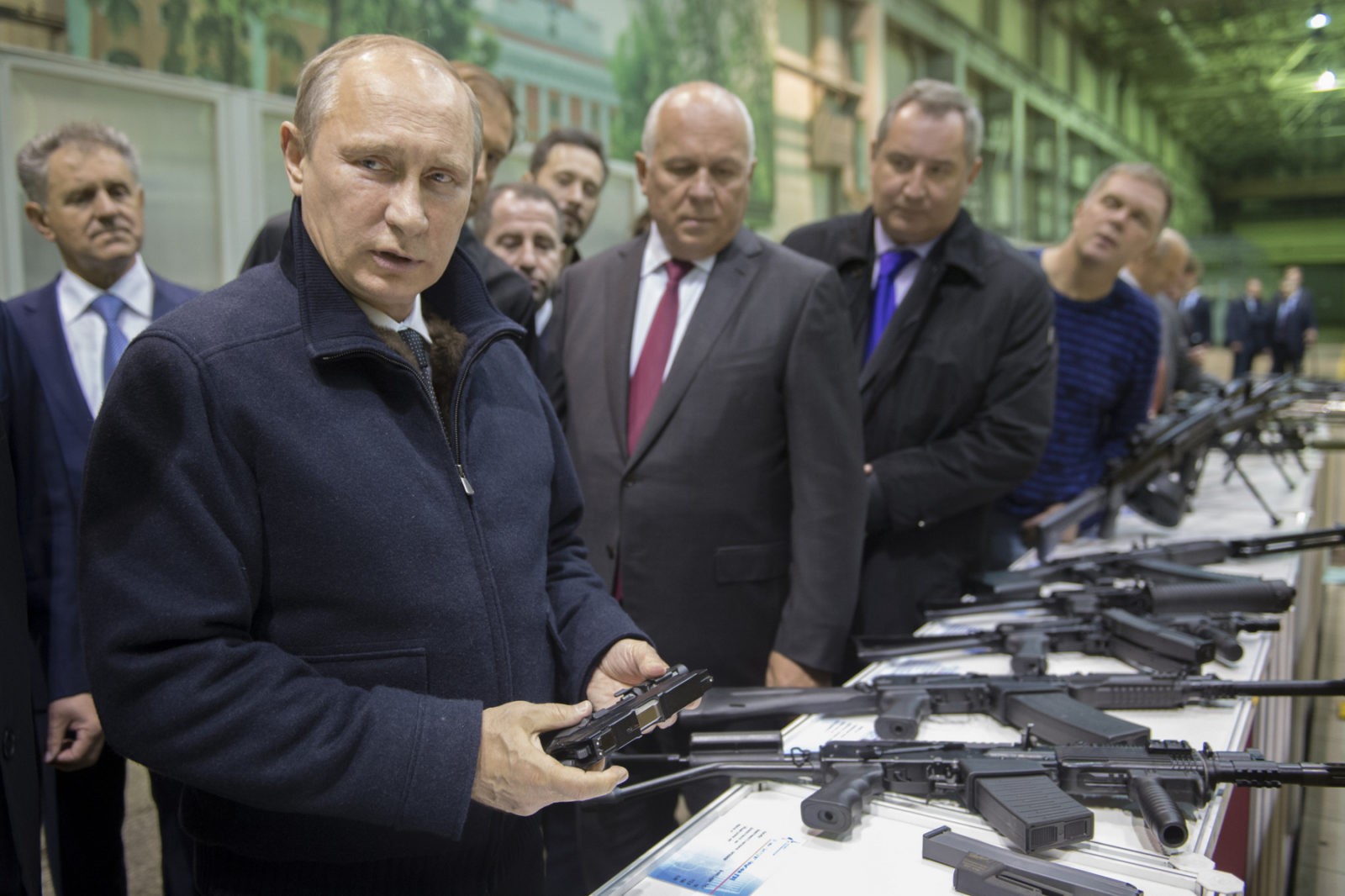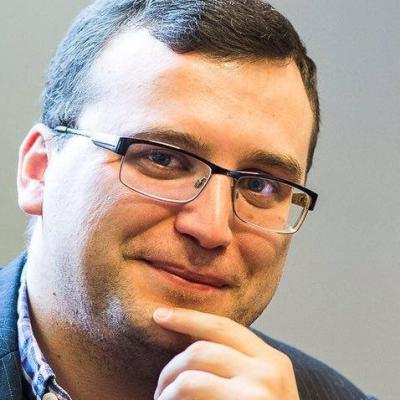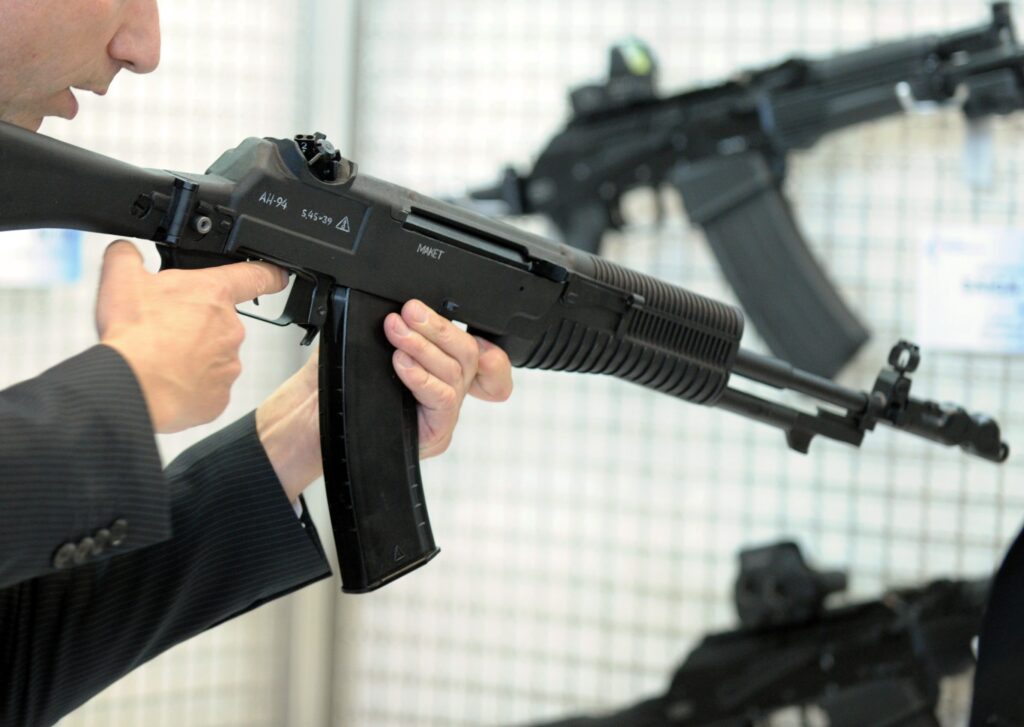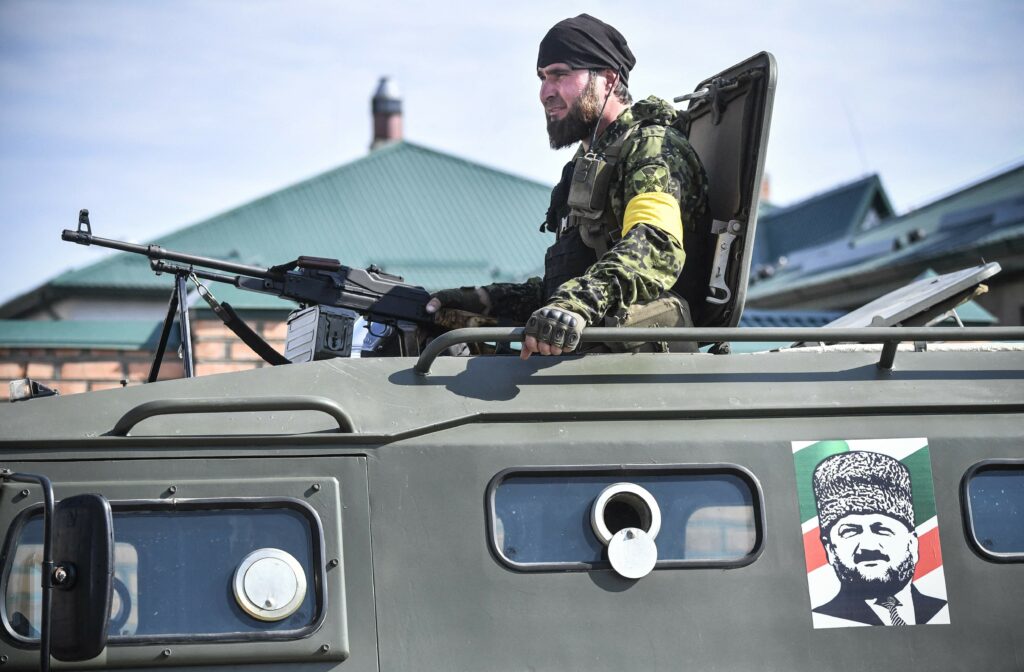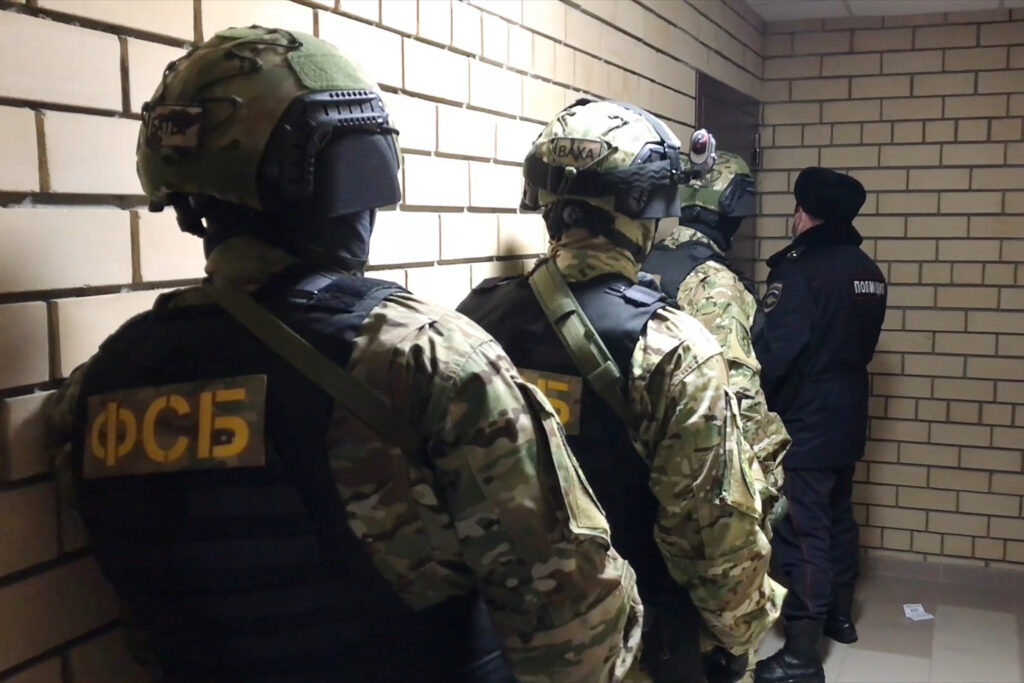Russia’s arms industry comprises over 1,300 companies, employing around two million people. These people and their families form one of the key pillars of support for the Kremlin. A key player in this field is Rostec, Russia’s military industrial behemoth, which incorporates over 700 companies and employs over half a million people. This state owned corporation oversees the research and development of military technologies, and owns several production facilities which play an instrumental role in putting those technologies into operation on the battlefield. Rostec and its subsidiaries produce a dizzying array of military equipment from helicopters and armoured fighting vehicles to Kalashnikov rifles and night vision goggles. In short, if the Russian military can use it, Rostec has had a hand in making it.
These are important times for Russia’s booming military industrial complex. The threat of using military force in the future is an increasingly important instrument of Russian foreign policy; this year alone Moscow is spending approximately 1.5 billion rubles on purchasing arms and military equipment. Therefore, the development of the military industrial complex has a huge influence on the political evolution of Russia’s regime. And to understand precisely what that means, we need to take a deeper look at the inner workings of Rostec.
RosTec’s Bosses and the New Russian Nomenklatura
Sergey Chemezov is not merely the CEO of Rostec; he also happens to be a former colleague and an old friend of Vladimir Putin. In fact, he is a leading member of his patron’s inner circle. In 1999, Chemezov became head of the state owned arms exporter Promexport, and then head of the newly created Rosoboronexport. This state owned company quickly gained a monopoly over Russian arms sales on the international market, and soon began to acquire its own production facilities inside Russia. In 2007, this growth culminated in the appearance of Rostech, another state owned corporation originally known as Rostekhnologii. Chemezov has clearly gained a great deal of political influence; remarkably, this influence has not come at the cost of beholding himself to any particular group — not even his own partners.
Of course, Rostech counts among its leadership a number of people who have worked with Chemezov for many years. These associates include Deputy General Director Vladimir Artyakov and one of the company’s managing directors, Vladimir Litvin. Another close associate of Putin’s chief military industrialist is Mikhail Shelkov, who today owns over 60% of the titanium company VSMPO-Avisma. Other trusted members of Chemezov’s team include Rostec’s Executive Director Oleg Yevtushenko and Dmitry Lelikov, another deputy general director of the corporation. Even this parade of influential people does not begin to hint at the influence of “Chemezov’s circle” in Russia’s halls of power.
A deeper look at the leadership of Rostech and the many companies under its wing unearths a number of people with close connections to Russia’s secret services, or at least with very colourful biographies. Sergey Abramov, for example, had quite a career: he graduated from a university in Tashkent, Uzbekistan, in either 1996 or 2001, after which he worked in the banking sector and even served as finance minister and prime minister of Chechnya in the early 2000s. Abramov then worked for several years as the head of the station management department of Russian Railways alongside Vladimir Yakunin, an (erstwhile) heavyweight from Putin’s inner circle. In 2015, Abramov joined Rostec as an industrial director, overseeing the development of conventional weapons.
Denis Manturov, Russia’s current Minister of Industry and Trade, is often described as a protégé of Chemezov. However, this view is mistaken. Although Manturov did work at Oboronprom, of which he eventually became general director, his involvement with military industry (specifically helicopter production) began in the early 1990s. Manturov’s rise is thanks to his father, who held various diplomatic posts representing the Soviet Union in India, Sri Lanka, and to the UN.
The examples above suggest that Rostec’s management is formed not by closeness to Chemezov nor by professional qualities but, with a few rare exceptions, on the principle of nomenklatura. In essence, the decisive role in career advancement is played by professional history and origin, readiness to obey orders at any given moment from whoever their bosses happen to be, and absolute loyalty to those superiors and their decisions. The ability to do all this, coupled with an ability to quickly adapt to periodic changes in the rules of the game, is euphemistically known as “political literacy.” Thus this state corporation, and the role of the functionaries who make it run smoothly, provides a good illustration of the Russian political system as a whole.
In several respects, today’s Russian nomenklatura is markedly different from that of the Soviet period. It is a stable, fairly closed, and multi-tiered network that developed towards the mid-2000s. The word “network” is used advisedly; today’s nomenklatura cannot be described as one of the Kremlin’s “bastions,” or an alliance between coherent “interest groups” within the Russian elite. After all, the only fully consolidated political group at such a high level is embodied by Putin’s inner circle. So when today’s nomenklatura lobbies for its interests, it does so as a managerial strategy as well as the more familiar means of competing for the state’s graces and resources. That is to say that the head of, for example, a state owned company such as Rostec fights for more than his personal interests; he also has to fight for those of his subordinates so as not to lose his authority over them (which would eventually spell the loss of his own position.)
In this sense, while different sections of Rostec may well have competing interests, Chemezov must also play the role of moderator in order to maintain his politically influential position. He must also take into account the interests of those whose positions depend on the state owned company, such as local elites in regions where the Rostec has a presence (of which there are more than 50.)
An Illusory Market
The Rostec corporation was initially created as an umbrella organisation to administer hundreds of Russia’s state owned arms companies. But very quickly, in the name of “Russia’s strategic interests,” it began to consolidate control over some civilian industries, too. These included parts of the automobile companies AvtoVAZ and KAMAZ, several airlines, and the titanium company VSMPO-Avisma.
Upon founding the company in 2008, the Russian government transferred 439 state owned enterprises to Rostec. The total number of employees of these companies at the time was 788,000. As Rostec’s management was eager to make all these various enterprises as competitive and efficient as possible, it began to amalgamate these new acquisitions into specialised holdings (in everything from aviation to ammunition and radio electronics.) A further step was to sack redundant personnel, meaning that in 2014, when Rostec owned over 500 companies, it had only 443,000 employees. Over the next three years, Rostec’s holdings grew to over 700 companies, but its managers started to be more wary of large staff cuts given the economic downturn. By the end of 2017, Rostec employed 512,000 people; after completing its takeover of the United Aircraft Corporation (UAC), this number will exceed 600,000.
Roster grew in other ways, too. Since 2011 the company has been a beneficiary of an extensive state programme for the development and procurement of weapons, one which was been enhanced by the import substitution policy of 2014. If in 2009 the revenue of the entire Rostec corporation, including its subsidiaries, amounted to 511 billion rubles ($16 billion at the average annual rate), then between 2011 and 2017 its total revenue increased from 817 billion to 1,589 billion rubles. However, the ruble’s devaluation led to a decrease in dollar earnings from $27.8 billion in 2011 to $27.3 billion in 2017. Nevertheless, given that the corporation ended 2009 with a net loss, its net profit from 2011 to 2017 had still increased from 46 billion ($1.57 billion) to 121 billion rubles (more than $2 billion.) This goes to show that Rostec increased its ruble revenues and generated profits only due to a sharp growth in weapons purchases by the government, and grew only thanks to the takeover of a large number of companies.
When arms purchases (probably only temporarily) stabilised in 2017 at 1.5 trillion rubles a year, Rostec had to consolidate its military production accordingly. So at the end of 2018, Putin decreed a takeover of the United Aircraft Corporation (UAC), which was the world’s 14th-largest defence company, though far from the world’s most cost effective (it is worth remembering that many such companies and factories in Russia are unprofitable despite their size.)
Alongside its other revenue figures, the Rostec corporation declares that in 2017 alone, the monopoly arms exporter Rosoboronexport delivered military products worth $13.4 billion to the international market. It is hard to say whether this entire figure can be factored into Rostec’s own income stream, given that Rosoboronexport also sells products from other enterprises.
However, since 2012 Rostec has also started to reduce its shares in a number of companies. For example, the corporation has retained a blocking stake in VSMPO-Avisma. Shelkov has also become a leading co-owner in VSMPO-Avisma, though it is also possible that he is acting as a nominal beneficiary of the company, which manufactures titanium products for Airbus, Boeing, and Embraer. In 2014, 49% of the shares in the Kalashnikov concern were sold to TKH-Invest, which is jointly owned by Alexey Krivoruchko (a former employee of Rosoboronexport and the current deputy defence minister for armaments) and the well-known businessmen Iskandar Makhmudov and Andrey Bokarev. In 2018 they increased their stake in the business to 75% minus one share.
That same year, Kalashnikov acquired a 60% stake in NPO Molniya, a manufacturer of rockets and missiles, from Rostec. In 2018, Rostec and the Marathon Group also merged their pharmaceutical assets. The co-owner of Marathon Group is Alexander Vinokurov, son-in-law of Russian Minister of Foreign Affairs Sergey Lavrov.
These sales and mergers have continued into 2019. Just a few months ago, the banker Viktor Grigoriev acquired 75% minus one share of Tekhnodinaminka, a manufacturer of aviation, aerospace, and nautical equipment. Grigoriev’s NK Bank has worked with Russia’s military industries since the early 1990s, while he once worked for Oboronprom as a deputy to Manturov. In 2019, Rostec and Sistema merged their production of microelectronics. Also on the cards is the sale of a controlling stake in Uralvagonzavod (UVZ), a manufacturer of tanks, railway locomotives and carriages, and construction equipment (Rostec bought up the company in 2017 to save it from bankruptcy.)
All these moves seem to suggest that Rostec has several longer term goals in mind. Firstly, the corporation wants to create a reliable source of profit out of VSMPO-Avisma. Secondly, Rostec’s managers want to be compensated for the corporation’s losses (such as bailing out unprofitable companies) by developing a more flexible approach of military production; this will be achieved thanks to conditional investment from the private Kalashnikov and Technodinamka corporations. Finally, Rostec wants to secure further monopolies in those sectors of military industry which the Russian government supports through protectionist policies. These sectors, which include electronics and pharmaceuticals, will see guaranteed demand driven growth over coming years due to import substitution programmes.
Under Russia’s current economic and political conditions, the most likely scenario is that the government continues to dismantle what remains of a market economy. The Kremlin has already made clear its desire to nominate certain defence companies as exclusive suppliers of equipment to mining and energy companies, and has even issued a directive stating that consumer products should comprise 50% of the military industry’s revenue by 2030. Rostec’s latest financial report, in contrast, puts that share at 29.1% of revenue, or 462.4 billion rubles. However, the same report also claims that civilian production amounted to 548 billion rubles. Without factoring in the possibility of misleading data, this discrepancy suggests that in 2017, 86 billion rubles’ worth of civilian production was actually not sold at all.
So where does all this leave Rostec? It leaves the company’s management and employees with a clear collective interest in furthering the Russian government’s protectionist measures, rooting for the adoption of even tougher measures to protect Russia’s civilian and military industries alike from competition.
